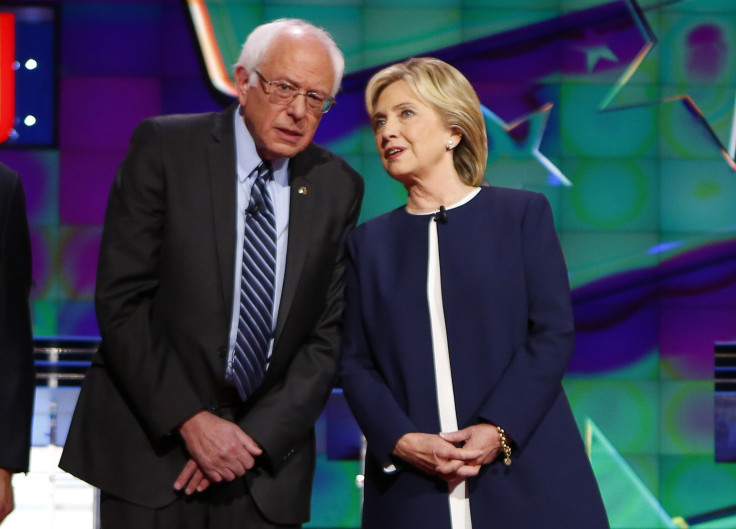Democratic Presidential Debate 2015 Rules: Regulations Set For Hillary Clinton-Bernie Sanders Showdown On CNN

With two highly viewed Republican debates already wrapped, the Democratic presidential candidates were to get their turn in the limelight in Las Vegas Tuesday night. The field was headlined by former Secretary of State Hillary Clinton and Vermont Sen. Bernie Sanders, who top the polls and will face off directly for the first time.
Also expected in Las Vegas are lagging candidates former Maryland Gov. Martin O'Malley, former Virginia Sen. Jim Webb and former Rhode Island Gov. Lincoln Chafee. The debate will be hosted by CNN and Facebook. It's scheduled to begin at 8:30 p.m. EDT and will be aired by CNN and CNN International and via live stream.
Heading into the important night, the Democratic race seems like a two-person affair, unlike the cluttered Republican field led by outspoken billionaire Donald Trump. Using the Real Clear Politics average of national polls, Clinton leads the Democratic field, having earned 42 percent of primary voters. Sanders follows at 25.4 percent, Webb is third at 0.9 percent, O'Malley fourth at 0.6 percent and Chafee at 0.2 percent. Vice President Joe Biden, who hasn't decide if he'll run, is still polling third at 18.6 percent nationally.
With fewer people in the field, the Democratic debate promises to be a lot different from the Republican debates. While the 16 GOP candidates had to elbow for airtime, the Democratic presidential hopefuls probably aren't worried about getting the floor but rather making sure they don't misstep when they voice their positions.
Below are some of the basic rules for the night:
Joe Biden can join (but at this point it's pretty unlikely he will): CNN outlined forgiving parameters for a candidate to be included in the first Democratic debate, allowing wiggle room for the vice president should he decide at the eleventh hour to run for president and participate in the event. In order to participate, a candidate must have officially declared his/her candidacy and must be earning at least 1 percent through an average of three polls. If Biden decides he's running, he can jump in. Organizers have even stowed away an extra lectern just in case.
Anderson Cooper will moderate: CNN journalist and on-air personality Anderson Cooper will be asking the lion's share of the questions Tuesday night. He promised in an interview with the New York Times that he would challenge candidates on comments that conflict with their record. “I believe if somebody says something that is factually incorrect, it’s a good thing to point out what the record shows,” he said to the Times. “If somebody is saying something about their record that is not something they’ve said in the past or is different from what they’ve said in the past, then you can point that out.”
Other hosts will be on hand: Alongside Cooper will be his CNN colleagues Dana Bash and Juan Carlos Lopez. They'll pose questions to the candidates as well. Notably absent is Jake Tapper, who hosted CNN's Republican debate.
Facebook will get involved: CNN personality Don Lemon will sift through suggestions posed by users on Facebook and will, in turn, relay the questions to the candidates. Use the hashtag #DemDebate to get involved.
Time is on their side: For the GOP CNN debate, the umpteen candidates were worried about getting time to answer questions. They got just one minute per answer and 30 seconds per rebuttal. CNN has yet to outline such guidelines for Democratic debate, although there will likely be some constraints. Jeff Zucker, president of CNN Worldwide, said that with fewer candidates on stage, the network's approach this time will involve more-focused questions.
“You’ll likely see more direct questioning of each individual candidate,” Zucker said to the New York Times.
Supplies: At the GOP debate, CNN didn't allow candidates to bring much with them on stage. That meant no cell phones, tablets, notes or props to help them llustrate their points. Each candidate was given a blank notepad, a pen and a glass of water, and there is no reason to believe that would change for the Democratic debate.
© Copyright IBTimes 2025. All rights reserved.






















